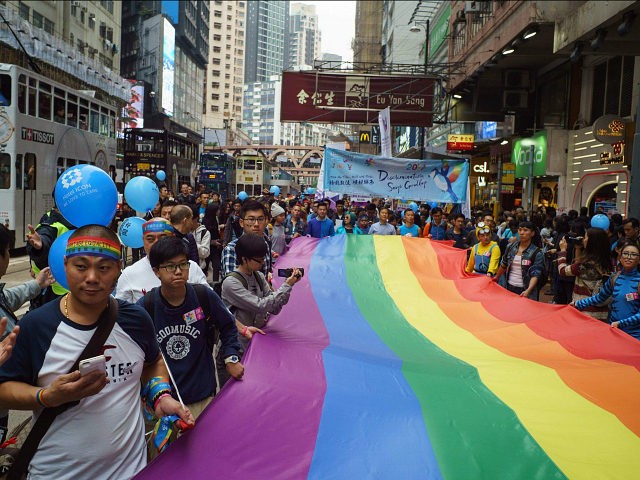Chinese social media platform Sina Weibo, essentially China’s version of Twitter, has reportedly abandoned a “clean-up campaign” that would remove “pornographic, violent, or gay subject matter” after users complained about the crackdown on gay material.
Sky News reports that the backlash was furious enough to affect the price of Weibo stock:
More than 56,000 posts had been removed by the end of Friday, but the South China Morning Post reported that the #ImGay hashtag had also been viewed almost 300 million times before it was censored.
One user wrote: “There can be no homosexuality under socialism? It is unbelievable that China progresses economically and militarily but returns to the feudal era in terms of ideas.”
Another described the ban as “discriminatory”, while one asked: “How is it that public opinion has narrowed so much in the last two years?”
The campaign to “purify” Weibo content began in earnest on Friday, with the stated goal of creating a “clean and harmonious community environment” in compliance with China’s strict Internet laws.
According to the state-run Global Times, one of the first groups to detect the heavy hand of censorship were users writing fictional gay relationships between Marvel superheroes, such as Captain America and his sidekick Bucky or Asgardian gods Thor and Loki (who are apparently adopted brothers).
The Hong Kong Free Press notes that a large online community called the “funu,” or “deviant girls,” described as “heterosexual women who are avid fans of male gay romances,” was also instrumental in the pushback.
A magazine called The Gay Voice announced it would suspend publication within six hours on Weibo, declaring the crackdown underway. The announcement was picked up and retweeted thousands of times under the #ImGay hashtag, becoming an early weapon in the pushback from Weibo users. After Weibo canceled the crackdown, The Gay Voice said it would resume publication.
Another much-repeated post was from a Shanghai woman with a gay son who accused Weibo management of “discriminating against and attacking this sexual minority.” Weibo evidently tried deleting the pushback posts at first but was unable to keep up with the sheer volume of them.
“I feel totally surprised and touched,” Weibo founder Hua Zile told CNN on Monday. “Seven years ago, not that many people were willing to make their voices heard this way. It’s amazing to see this happen now, with everyone – straight or gay, celebrities or ordinary people – using the hashtag and joining in.”
Outside observers find it remarkable that Hua would be either surprised or touched by the failure of the anti-gay censorship campaign. Many accounts of the Weibo debacle describe the outcome as stunning to China’s powerful censorship apparatus, which does not generally take “no” for an answer.
CNN speculates the confusion was the result of a power struggle between factions of the Chinese political elite with different positions on homosexuality. Others propose that China’s government is more interested in reducing pornographic and violent content than banning gay material per se.
The Hong Kong Free Press points out that quite a bit of material was banned between Friday’s censorship charge and Monday’s retreat, probably including a number of accounts the censors were more interested in squelching than gay and lesbian groups. For example, a popular news aggregator called Toutiao was chastised for allowing its users to “share ribald jokes and videos,” and in response, pledged to “increase its censorship staff to 10,000.” Successfully sending a message like that is worth a bit of unexpectedly strong resistance from China’s gay community to the speech police in Beijing.

COMMENTS
Please let us know if you're having issues with commenting.